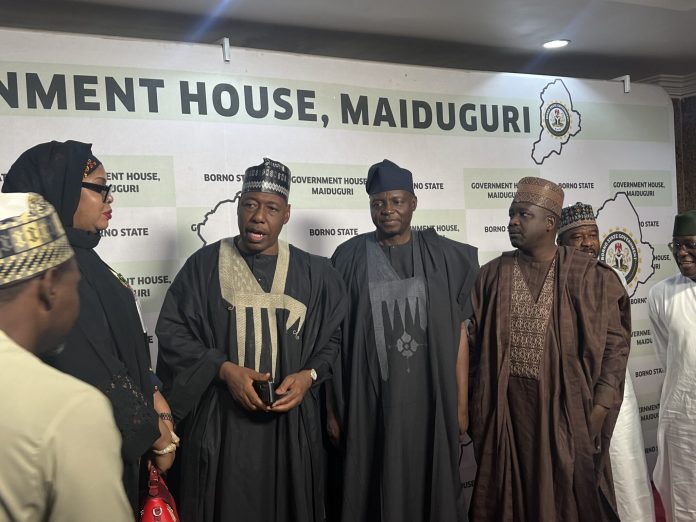The Federal Government on Tuesday expressed commitment to mainstreaming Borno as a focal area in the 2025 Nigeria Humanitarian Response Plan.
Prof. Nentawe Yilwatda, Minister of Humanitarian Affairs, Disaster Management and Social Development, said this in Maiduguri during a courtesy visit to Gov. Babagana Zulum.
Yilwatda underscored the importance of addressing the state’s unique challenges stemming from years of insurgency and displacement, adding that Borno’s humanitarian needs would take centre stage in the plan starting from January 2025.
“Borno is the main state experiencing a humanitarian crisis in Nigeria. We aim to partner with the state government to ensure its inclusion in the national response plan.
“In addition to addressing immediate needs, the federal government aims to provide long-term solutions for Internally Displaced Persons (IDPs) and refugees,” he said.
Yilwqtda also highlighted plans to integrate the state officials into a national humanitarian response committee.
“We want to ensure that the challenges of Borno State are mainstreamed into the response plan.
“This will not only benefit the state but also serve as a model for other regions facing similar crises,” he said, adding that the ministry was also focusing on durable solutions beyond short term humanitarian aid.
He sai the ministry would empower displaced persons by providing skills and income generating opportunities, to enable them to rebuild their lives and contribute to the economy.
Yilwqtda reiterated commitment to repatriate Nigerian refugees in Chad, Niger and Cameroon, stressing that, “these refugees are our brothers and sisters, and we aim to reintegrate them back into their communities in Nigeria.
“We are working on providing a human face to their experiences ensuring their smooth return”.
He announced plans by the ministry to support farming initiatives for displaced persons and host communities in view of the importance of agriculture to fast track sustainable recovery of the state.
According to him, the ministry will provide farming support to enable families to earn a living and educate their children, geared towards contributing to long term stability.
While lauding Zulum over his efforts to rebuild the state, Yilwatda pledged continued collaboration with the state government.
“Borno’s progress is a testament to focused governance. Together, we will ensure no child, woman or man is left behind in our efforts to rebuild the state and the nation”.
Responding, Zulum highlighted the pressing challenges being faced by the state, including dwindling funding from the UN agencies and development partners to support IDP camps.
“The NGOs and UN organisations are doing very well, but they lack the available funding to sustain our people in the camps.
“Therefore, we shall accept the people back to their ancestral homes in a dignified manner,” Zulum said.
He emphasised the need for transition from short term humanitarian solutions to medium and long term strategies that ensure sustainability and resilience for the displaced persons.
The governor also outlined plans to provide livelihood support for Boko Haram victims as well as tackle the complex issue of managing repentant Boko Haram members.
“We need to focus on providing livelihoods to victims of insurgency while addressing the challenges of reintegrating repentant Boko Haram members into society,” he said.
Zulum stressed the importance of repatriating Nigerian refugees from neighbouring countries, particularly Cameroon, within the next three to four months.
“We need to close this chapter and bring them back home safely,” he added.
The governor reaffirmed his commitment to collaborate with federal agencies, the EU, the UN, and other international partners to develop a robust humanitarian response plan.
“Drawing from my experience as a member of the Federal Government Committee on Humanitarian Response from 2015 to 2019, I emphasised the need for innovative and sustainable solutions.
“We want to shift from providing short term, non sustainable solutions to medium and longer term, durable solutions,” Zulum said. (NAN)


